CRI® Group’s 3rd ABAC Summit 2019 Sets the Tone at the Top
CRI® Group’s 3rd ABAC Summit 2019 Sets the Tone at the Top
CRI® Group, a global leader in risk and compliance hosted the “3rd Anti-Bribery Anti-Corruption Summit 2019” in association with ICCI, GPCCI, Bank Al Habib, Transparency International Pakistan, ACFE Corporate Alliance USA, ICA and Fraud Advisory Panel UK. The one-day event was held in Islamabad, Pakistan, marking a return to Pakistan for this annual event that debuted in Karachi in 2017 (last year’s ABAC Summit 2018 was held in Kuala Lumpur, Malaysia).
The Summit embraced the theme of “Setting the Tone at the Top” for sharing invaluable expertise in due diligence, internal controls and compliance issues, along with showcasing the latest resources and solutions to detect and prevent bribery and corruption. The main aim of the event was to provide guidance and training that enables business sectors to fight malpractices and learn about the latest resources and solutions to detect and combat bribery and corruption within the organisation.
A large number of CEOs, CFOs, directors, compliance and legal officers, lawyers, and due diligence and risk management professionals from leading corporate entities who attended the ABAC Summit were there to gain invaluable expertise from distinguished expert speakers and share their knowledge with the participants.
Mr. Zafar I Anjum, CEO of CRI® Group:
CRI® Group founder and CEO Mr. Anjum provided the introductory welcome. During his speech, Mr. Anjum highlighted that “Systematic corruption continues to be a substantial obstacle in both the public and private sectors nowadays. Corruption is a cultural issue that will only change as future generations are made aware of the detrimental impact of corruption in our society. The most powerful tool an organization can use to demonstrate ‘adequate procedures’ as an effective bribery defense and deterrent is ISO 37001. ABAC® Centre of Excellence works to educate, equip and support the world’s leading business organizations with the latest in best-practice due diligence processes and procedures, not only in Pakistan but around the globe”.
Mr. Drago Kos – Keynote Speaker, Chairman of Working Group on Bribery in International Business Transactions at Organization for Economic Co-operation & Development:
Mr. Drago Kos highlighted that “in 41 percent of cases, management-level employees paid or authorised the bribe, whereas the company CEO bribed in 12 percent of cases.” He also added that “organizations where leadership, management and workforce do not take corruption seriously will never be adequately protected from risk” Mr. Kos urged businesses to apply disciplinary procedures against breaching ethics and compliance programs and anti-corruption measures. CEOs and managers face increased pressure to prevent bribery and corruption and maintain compliance. They also “influence everything by their management style, and are role models for their employees”, therefore, setting an ethical “Tone at the Top” is hugely important.
Dr. KM Loi Vice-Chairman of ISO/PC 278 (ISO 37001:2016), Co-convenor of ISO/TC 309 WG2 (ISO 37001 Handbook)
Dr. KM Loi was part of a Project Committee which was responsible for the design and development of ISO 37001:2016 – Anti-Bribery Management System (ABMS) standard. Dr. Loi spoke in depth about the threat of bribery and corruption, and how a management system like ISO 37001:2016 can help an organisation remain better protected and in compliance. “Bribery is one of the greatest challenges to international development and poverty relief” Dr. Loi said.
“According to OECD, estimates show that the cost of corruption equals more than 5 percent of global GDP”, Dr. Loi said (this equates to US $2.6 trillion, according to the World Economic Forum), “with over US $1 trillion paid in bribes each year”, (according to the World Bank). “It is not only a question of ethics; we simply cannot afford such waste. This is money that could have been spent on improving life for millions if not billions of people”
Mr. Mian Muhammad Ateeq Sheikh – Senator:
Mr. Senator took a part in presenting his thoughts on bribery & corruption at the ABAC summit. He said, “bribery and corruption is eating away Pakistan’s foundation. Our country is unfortunately way down on the ladder on this account. Corporate Research and Investigations (CRI Group) is taking actual encouraging procedures to fight against bribery and corruption. The administration sector should come up with strong compliance and legitimate regulations and take apart in the fight against this white-collar crime”. He also addresses, “NAB plays a very important role in fighting against serious corporate crime. The present government should bring strong control in compliance management system, he also said “We can save the future of our generation by fighting the corrupt practices today”.
Mr. Irfan Naeem Mangi, Director General National Accountability Bureau (NAB):
The speaker presented the national efforts against corruption and an overview of NAB: “Rigorous imprisonment up to 14 years, imposition of fine not less than the illegal gain, immediately cease to hold public office, disqualified for 10 years from holding public office, no financial facility / loan allowed for 10 years” this is how sections 10, 11 and 15 of NAO 1999 deals with punishment of corruption and corrupt practices.”
Mr. Faisal Anwar, Independent Consultant/Adviser & Trainer:
Mr. Faisal Anwar discussed the role of ethics and compliance culture with focus on the banking sector of Pakistan. “A good culture is about more than ensuring good people don’t do bad things – it’s about enabling good people to do better things” (Alison Cottrell, CEO, Banking Standards Board, UK) – the quote illustrated anti-bribery and anti-corruption risk management strategy. “The strategy should consist of policies, risk assessments, remedial actions, training and communication, culture, controls and oversights, business parties and third-party monitoring”, Mr. Anwar suggests.
Mr. Uzair Ahmed Certification Manager at ABAC® Center of Excellence:
Mr Uzair presented the concept of ISO 37001 and the certification process overview. “The organisation can choose to implement this anti-bribery management system as a separate system, or as an integrated part of an overall compliance management system. The organisation can also choose to implement this anti-bribery management system in parallel with, or as part of, its other management systems, such as quality, environmental and information security”, Mr. Uzair explains.
Mr. Shauzab Ali, Commissioner Securities Exchange Commission of Pakistan-SECP (Specialized Companies Division, Securities Market Division, Anti-Money Laundering Department:
Mr. Ali discussed the issued Corporate Governance Frameworks issued by Securities and Exchange Commission of Pakistan. He also highlighted one of the main responsibilities, power and functions of the Board: “the Board shall also develop and implement a policy on “anti-corruption” to minimise actual or perceived corruption in the company. Development of whistle-blowing policy and protection mechanism” – Mr. Ali lists.
Mr. Azhar Zia Ur Rehman, Governance Consultant:
The speaker presented the practical road map for implementing the Anti-bribery Management System. “Set of interrelated or interacting elements of an organisation, establish anti-bribery policies and anti-bribery objectives and processes to achieve those anti-bribery objectives”. The detailed process was discussed which will ensure organisations for the successful ABMS implementation.
Benefits to Attendees
Apart from the speeches of the distinguished experts, the summit included highly informative work sessions, group discussions, Q&A periods and plenary sessions to address the many challenges being faced by the corporate world. A post-event survey of the attendees found that 82 percent face challenges raising awareness amongst employees about anti-bribery and anti-corruption measures. They are doing something to remedy that, however 88 percent said they are looking to implement ABMS certification and/or ABMS training at their organisations within the next six months.
Mr. Zafar Anjum thanked the government officials, speakers and participants of the event for taking corruption and bribery as a serious issue and joining hands with CRI® Group to share knowledge and expertise. Mr. Anjum has dedicated over 30 years to the areas of fraud prevention, protective integrity, security and compliance. His expertise helps create secure networks across challenging global markets. Attendees noted their overwhelming satisfaction with the event in the survey results, and CRI® Group is already looking forward to hosting another successful ABAC Summit in 2020.
CRI® Group is pleased to announce the upcoming Anti-Bribery 2018 Summit in Kuala Lumpur, Malaysia, 25 September 2018. This is the second year for the ABAC Summit, providing invaluable expertise in due diligence, internal controls and compliance issues, along with showcasing the latest resources and solutions to detect and combat bribery and corruption within organisations.
The one-day summit is a must-attend event for anyone working in anti-bribery and anti-corruption, due diligence, risk management, and anti-fraud such as CEOs, CFOs, Chief Legal Officers, Chief Compliance Officers, In-house Counsels, Compliance Managers, Lawyers and Auditors, Heads of Procurement and Other officers responsible for Compliance and Anti-Corruption.
Last year’s Anti-Bribery Summit was a great success, with critical topics presented by leading experts in anti-bribery and anti-corruption compliance. This year aims to be even better, with an agenda that includes the following highlights:
- A welcome introduction by Zafar Anjum MSc, CFE, Intl. Dip. (Fin. Crime). As founder and CEO of CRI Group, Zafar Anjum has dedicated 28 years to the areas of fraud prevention, protective integrity, security and compliance. His expertise helps create secure networks across challenging global markets.
- Mohd Nur Lokman Bin Samingan, Assistant Commissioner at Malaysian Anti-Corruption Commission (MACC), will present “MACC (Amendment) Act 2018: Section 17A, ‘Offence by Commercial Organization’”. Mohd Nur Lokman Bin Samingan has vast experience as an investigator and a prosecuting officer, and is currently attached to the Community Education Division of MACC as the head of Private Sector Branch. He engages business entities, corporations and private companies in cultivating anti-corruption awareness.
- Dr KM Loi, Vice-Chairman of ISO/PC 278 (ISO 37001:2016), Co-convenor of ISO/TC 309 WG2 (ISO 37001 Handbook), will present “ISO 37001:2016 – Management Tool to Address Corporate Liability Provision”. Dr KM Loi is an anti-bribery expert with 20 years of management skills in quality consulting, training and auditing with wide exposure to various industries in the context of ISO 9001, ISO 14001, ISO 13485, IATF 16949, ISO 26000, ISO 37001, SA8000 & OHSAS 18001.
- Drago Kos, Chairman of Organization for Economic Co-Operation & Development, will present “Corporate Integrity Guarantees Prosperity”. Drago Kos is the Chairman of the OECD Working Group on Bribery in International Business Transactions, Co-Chair of the Defence Corruption Monitoring Committee in Ukraine and adviser to the Kosovo Anti-Corruption Agency.
- Cristian Nicoara, Independent Expert Consultant; Justice, Anti-Corruption, and Security Sector Reform Adviser, will present “Anti-Corruption Agencies are Fighting an Imbalanced Battle. Where to Find the Allies?” Cristian Nicoara is a former Romanian investigative prosecutor with 15 years specialisation in major crimes, anti-corruption and financial investigations.
- Md Alimuddin Rahim, Group Integrity Officer at Petra Energy Berhad, will present “Role of Malaysian Anti-Corruption Foundation (NGO) in assisting Malaysian Anti-Corruption Commission (MACC)”. Md Alimuddin Rahim has more than 20 years’ experience in his industry – he is the Secretary General at Malaysian Anti-Corruption Foundation and also works as Group Integrity Officer at Petra Energy Berhad.
- Presenter Cynthia Gabriel, Executive Director at The Center to Combat Corruption and Cronyism (C4 Center), human rights advocate and anti-corruption leader in Malaysia will present “New Lessons from 1MDB: The evolving actors in modern money laundering”. Cynthia Gabriel has experience advancing and promoting human rights, good governance and democratic freedoms. She founded the Centre to Combat Corruption and Cronyism (C4), a NED grantee, which works to promote good governance and conducts a multifaceted project designed to encourage public participation in efforts to combat corruption.
- A special panel discussion and Q&A session will feature all of the keynote speakers.
- An hour at the conclusion for additional networking among attendees, with refreshments provided.
CRI® Group founder and CEO Zafar Anjum said that after the success of last year’s inaugural event in Pakistan, he is excited about the second Anti-Bribery Anti-Corruption Summit in Kuala Lumpur, Malaysia. “This year’s agenda was developed to provide you with invaluable information and foresight into the forces that guide and dictate our everyday work life: the ongoing quest for solutions, balance, and insight into the oftentimes chaotic world of anti-bribery and corporate corruption compliance”, Anjum wrote. This is a critical time for world markets and economies. The latest Corruption Perceptions Index shows that “most countries around the world are making little or no progress in ending corruption” (Transparency international, titled “Corruption perception index 2017”, 2018).
That’s why the expertise, best practises and resources shared by the leading industry experts at the ABAC Summit are more important than ever. In the Asia Pacific region alone, the majority of countries are in the lower half of this year’s Corruption Perceptions Index. This is because bribery is still a key problem, made worse by unaccountable governments, lack of oversight, instability and insecurity. There are positive signs as well. Officials in Malaysia, the host country of this year’s ABAC Summit, have made strides in the fight against bribery and corruption. According to MACC, 879 offenders – from top management to lower level staff, in both the public and private sectors – were arrested last year. This demonstrates Malaysia’s commitment to bringing offenders to justice.
Time is running out to make your plans to attend ABAC 2018 and get an edge on the latest best practises, laws, regulations and compliance, presented by the foremost experts in the field. Meet the colleagues you networked with at last year’s event; or make new connections with CEOs, CFOs, other executives, directors, lawyers, auditors, legal officers, compliance officers and others who face the same anti-fraud and anti-corruption challenges as you.
The first ABAC Summit Pakistan
On Thursday, 26 October, the region’s leading anti-fraud professionals gathered in Karachi, Pakistan, for CRI® Group’s Anti-Bribery Summit 2017. CRI® Group took the initiative to organize the first Anti-Bribery Summit in Pakistan with the goal to redefine the anti-bribery culture within organisations in the country.
The Anti-Bribery Summit couldn’t have come at a more critical time, or have been held in a more relevant location – Pakistan is on the front lines of a struggle between those who willfully engage in bribery and corruption, and those who endeavor to put a stop to it. But the problem of corruption is worldwide, affecting government, military and public sector organisations. The Anti-Bribery Summit 2017 included sessions on compliance for the most significant international laws and regulations, including a Q&A session with an expert on the Foreign Corrupt Practices Act.
Attendees also learned about compliance pitfalls, and how to engage in proper third party due diligence to keep their organisations safe from unethical partners that could hurt the organisation’s reputation and bottom line. “It was good to see international speakers from UN and OECD on the practices being used and available standards for comparing our policies and procedures,” said Riaz Nazarali Chunara, Director, State Bank Of Pakistan.
The Anti-Bribery Summit brought together some of the greatest minds in the fight against corruption, with a lineup of expert speakers that shared their experiences, knowledge and best practices with an attentive audience.
Keynote speakers included Drago Kos, Chair of the OECD Working Group on Bribery in International Business Transactions and Co-Chair of the Defence Corruption Monitoring Committee in Ukraine and advisor to the Kosovo Anti-Corruption Agency (see an exclusive video interview with Drago Kos about the Summit); Jouhaida Hanano, Criminal Justice Advisor – Sub-Programme II, UNODC Pakistan; Shehzad Yousuf, Chief Internal Auditor at PTCL; Tariq Hussain, Former Director / HOD Securities & Exchange Commission of Pakistan (SECP) – Supervision and Enforcement and Company Law Division; Ali Anwer Adil, Head of Internal Audit, Fraud Management and Revenue Assurance at Zong; and Ghulam Farooq, Director at The National Accountability Bureau.
“(It was) a wonderful conference on anti-bribery held by CRI®,” said Muhammad Nauman Ahmed, Head of Compliance at PEL. Ahmed said the “most amazing part” was that “OECD Anti-Bribery chairman Mr. Drago Kos and Director NAB, Sindh attended the conference.”
“SECP representatives were also present,” Ahmed said, calling it a “great event” for learning about the most current practices to counter bribery in Pakistan.
Featuring keynote addresses, Q&A sessions, trainings and a panel discussion, the Anti-Bribery Summit addressed topics critical to any organization leader or executive in the region including anti-bribery compliance issues, strategies, the FCPA and UK Bribery Act, the corporate culture in Pakistan, conducting proper risk management and due diligence.
“It was a really good event, very well organized and an excellent learning experience,” said Yousuf Ali, Executive Manager, Assurance, EY Ford Rhodes. “My team and I at Ernst & Young thoroughly enjoyed it. Especially the presentation from Mr Shehzad Yousuf.”
“We are looking forward to other such events,” Ali said.
CRI® Group thanks all of the attendees, speakers and everyone involved in making the Anti-Bribery 2017 an unmatched success.
About us…
Based in London, CRI® Group works with companies across the Americas, Europe, Africa, Middle East and Asia-Pacific as a one-stop international Risk Management, Employee Background Screening, Business Intelligence, Due Diligence, Compliance Solutions and other professional Investigative Research solutions provider. We have the largest proprietary network of background screening analysts and investigators across the Middle East and Asia. Our global presence ensures that no matter how international your operations are, we have the network needed to provide you with all you need, wherever you happen to be. CRI® Group also holds BS102000:2013 and BS7858:2019 Certifications is an HRO certified provider and partner with Oracle.
In 2016, CRI® Group launched the Anti-Bribery Anti-Corruption (ABAC®) Center of Excellence – an independent certification body established for ISO 37001:2016 Anti-Bribery Management Systems, ISO 37301 Compliance Management Systems and ISO 31000:2018 Risk Management, providing training and certification. ABAC® operates through its global network of certified ethics and compliance professionals, qualified auditors and other certified professionals. As a result, CRI® Group’s global team of certified fraud examiners work as a discreet white-labelled supplier to some of the world’s largest organizations. Contact ABAC® for more on ISO Certification and training.
MEET THE CEO
Zafar I. Anjum is Group Chief Executive Officer of CRI® Group (www.crigroup.com), a global supplier of investigative, forensic accounting, business due to diligence and employee background screening services for some of the world’s leading business organizations. Headquartered in London (with a significant presence throughout the region) and licensed by the Dubai International Financial Centre-DIFC, the Qatar Financial Center – QFC, and the Abu Dhabi Global Market-ADGM, CRI® Group safeguard businesses by establishing the legal compliance, financial viability, and integrity levels of outside partners, suppliers and customers seeking to affiliate with your business. CRI® Group maintains offices in UAE, Pakistan, Qatar, Singapore, Malaysia, Brazil, China, the USA, and the United Kingdom.
Contact CRI® Group to learn more about its 3PRM-Certified™ third-party risk management strategy program and discover an effective and proactive approach to mitigating the risks associated with corruption, bribery, financial crimes and other dangerous risks posed by third-party partnerships.
CONTACT INFORMATION
Zafar Anjum, MSc, MS, CFE, CII, MICA, Int. Dip. (Fin. Crime) | CRI® Group Chief Executive Officer
37th Floor, 1 Canada Square, Canary Wharf, London, E14 5AA United Kingdom
t: +44 207 8681415 | m: +44 7588 454959 | e: zanjum@crigroup.com
CRI™ Malaysia celebrates Anti-Corruption Day
Anti-bribery and anti-corruption efforts are a huge priority in the South Asia Region, with many governments trying to strengthen laws and enhance enforcement in both their private and public sectors. As recent high-profile corruption cases in the region have demonstrated, today’s regulators are seeing the issue as a societal problem as much as a legal one. That’s why CRI™ Malaysia celebrates Anti-Corruption Day partnered with the Malaysian Anti-Corruption Commission (MACC), Transparency International Malaysia (TI-M), the Malaysian Anti-Corruption Foundation and the Malaysian Youth Council for International Anti Corruption Day to raise awareness throughout Malaysia and beyond of the risks posed by bribery and corruption. Themed “United Against Corruption,” the event, held 9 Dec. in Kuala Lumpur, placed the focus squarely on stepping up the fight against corruption and helping position Malaysia a leader against fraud in the South Asia region.
United Against Corruption received extensive coverage in the press – including articles in the The Borneo Post, The Sun Daily, The Edge Markets and other outlets, and a video posted on MACC’s YouTube channel – helping to fulfil the goal of increasing awareness among the general public. As reported in The Borneo Post (“International Anti-Corruption Day celebrated nationwide,” 10 Dec. 2018), the event was held in conjunction with the Premier Walk-About Program and “celebrated simultaneously throughout the country to raise public awareness on the dangers of corrupt practices”.
Efforts increase following 1MDB scandal
The high-profile push against bribery and corruption comes just a few years after the 1MDB scandal first hit the news cycles in Malaysia and, eventually, across the world. Malaysia’s state-owned investment fund, 1MDB, was created to attract foreign investment, but instead it triggered a scandal that led to criminal and regulatory investigations that continue today. “A Malaysian parliamentary committee identified at least $4.2 billion in irregular transactions related to 1MDB. In May, Najib was ousted from power in a general election as the scandal fuelled a voter backlash that ended his party’s 61 years of rule. As the investigations continue, Najib faces trial on corruption charges and U.S. prosecutors have implicated at least three senior Goldman Sachs Group Inc. bankers in a multiyear criminal enterprise” (Bloomberg, 2018).
After-effects from the 1MDB case spread far beyond Malaysia and the South Asia region. In the U.S., federal prosecutors announced that one of the implicated former Goldman Sachs bankers had pleaded guilty, with bribery and money laundering charges lodged against a second banker as part of the investigation.
With eyes on Malaysia due to the breadth of the 1MDB scandal, the Malaysian Anti-Corruption Commission (Amendment) Act 2018 was passed in April of this year – with a provision on corporate liability. The amended act gives more power to the MACC in fighting corruption in the private sector, with penalties for firms that can now be held liable if their employees commit bribery.
On 25 Sept. 2018, Mohd Nur Lokman bin Samingan, Assistant Commissioner at Malaysian Anti-Corruption Commission, spoke in Kuala Lumpur at CRI Group’s Anti-Bribery Anti-Corruption (ABAC) Summit 2018, where he explained some of the key objectives of the 2018 Amendment Act. Among them, the new provisions are meant “to encourage business and commercial activities being carried out in a corruption-free environment; to encourage all commercial organisations to take adequate measures in order to prevent corruption in their respective organisations; and to promote better corporate governance and legal compliance by requiring corporations to take proactive roles in preventing corruption”. Mr. Mohd Nur Lokman went on to explain that punishment for bribery and other corrupt acts under the amendment can include fines “of not less than 10 times the sum of value of the gratification which is the subject matter of the offence”, or one million ringgit (whichever is higher) – and can also include imprisonment for a term not exceeding 20 years.
What is clear to everyone, however, is that governments cannot fight the war on corruption alone. It is critical for government organisations to work hand-in-hand with private sector corporations, non-governmental organisations (NGOs) and nonprofits to change the culture and tolerance level of bribery and corruption along with the legal framework for prosecuting it. In today’s business landscape, companies have found that it is far better to be proactive in the fight against fraud rather than to try to sweep problems under the rug. The problem in years past was a lack of a consistent framework for organisations to follow in efforts to increase their compliance and decrease risk on their own.
ISO 37001 Anti-Bribery Management System
That’s why the International Organization for Standardization (ISO) issued the ISO 37001 Anti-Bribery Management System standard in 2016: to help organisations worldwide increase and measure their efforts against bribery and corruption. As an accredited provider of ISO 37001 training and certification, CRI Group has been helping organisations at every level through measures that include adopting an anti-bribery policy, appointing a person to oversee anti-bribery compliance, training, risk assessments and due diligence on projects and business associates, implementing financial and commercial controls, and instituting reporting and investigation procedures. Experts in CRI Group’s ABAC Centre of Excellence help walk clients through specific requirements and provide guidance for establishing, implementing, maintaining, reviewing and improving an anti-bribery management system. The system can be stand-alone or can be integrated into an overall management system.
ABAC Group’s ISO 37001 training and certification process helps companies or government organisations reduce the risk of bribery by establishing, implementing, maintaining and enhancing internal anti-bribery and anti-corruption systems. This comprehensive protocol can:
- Provide needed tools to prevent bribery and mitigate related risks
- Help an organisation create new and better business partnerships with entities that recognise ISO 37001 certified status, including supply chain manufacturing, joint ventures, pending acquisitions and co-marketing alliances.
- Potentially reduce corporate insurance premiums
- Provide customers, stakeholders, employees and partners with confidence in the entity’s business operations and ethics
- Provide a competitive edge over non-certified organisations the organisation’s industry or niche
- Provide acceptable evidence to prosecutors or courts that the organisation has taken reasonable steps to prevent bribery and corruption.
Which organisations need ISO 37001?
ISO 37001 can be used by any organisation, large or small. It specifies a series of common-sense measures to help prevent, detect and address bribery that can benefit organisations of any industry or type. These include adopting an anti-bribery policy, appointing a person to oversee anti-bribery compliance, training, risk assessments and due diligence on projects and business associates, implementing financial and commercial controls, and instituting reporting and investigation procedures.
United Against Corruption helped to bring to the forefront an issue that must remain near or at the top of the priority list for most organisations in the South Asia region. With anti-bribery and anti-corruption laws and regulations changing at a rapid pace, organisations must keep up with the latest compliance requirements. In fact, many South Asia governments are trying to improve on spotty records of prevention and enforcement when it comes to bribery and corruption in both their private and public sectors. That’s why implementing a standard like ISO 37001 – Anti-bribery Management System can be invaluable to organisations that aim to have a comprehensive approach to compliance in this area.
Who is CRI Group™?
Based in London, CRI Group™ works with companies across the Americas, Europe, Africa, Middle East and Asia-Pacific as a one-stop international Risk Management, Employee Background Screening, Business Intelligence, Due Diligence, Compliance Solutions and other professional Investigative Research solutions provider. We have the largest proprietary network of background-screening analysts and investigators across the Middle East and Asia. Our global presence ensures that no matter how international your operations are we have the network needed to provide you with all you need, wherever you happen to be. CRI Group™ also holds BS 102000:2013 and BS 7858:2012 Certifications, is an HRO certified provider and partner with Oracle.
In 2016, CRI Group™ launched Anti-Bribery Anti-Corruption (ABAC™) Center of Excellence – an independent certification body established for ISO 37001:2016 Anti-Bribery Management Systems, ISO 37301 Compliance Management Systems and ISO 31000:2018 Risk Management, providing training and certification. ABAC™ operates through its global network of certified ethics and compliance professionals, qualified auditors and other certified professionals. As a result, CRI Group’s global team of certified fraud examiners work as a discreet white-labelled supplier to some of the world’s largest organisations. Contact ABAC™ for more on ISO Certification and training.
Lessons from the Ghosn affair
Ghosn lessons
It is difficult to overstate the sense of scandal that has accompanied the revelations that Carlos Ghosn, chairman of Nissan, has been accused of significant acts of misconduct.
Mr Ghosn has virtual cult-hero status in Japan for reviving Nissan, and he is the lynch pin in the alliance Renault-Nissan-Mitsubishi Motors, where he is both CEO and Chairman, as well as being CEO of Renault.
The allegations span many years and include understating his Nissan earnings to the stockmarket and the misuse of company assets. It is early days and this saga is likely to run, but we can already draw some lessons from a governance and compliance perspective.
Firstly, it is not all bad. The alleged wrongdoing was uncovered by a whistleblower, subsequently followed up by a lengthy and extensive internal investigation. Having received the full investigative report, the company seems to have acted decisively and transparently against someone at the most senior level.
Clearly, the company has systems and processes that can respond to individual transgressions. But very few such transgressions are purely anomalies. Why did the board and shareholders not ask more questions about potential conflicts as Mr Ghosn accumulated more power, when he took on chairman and CEO roles across major auto businesses?
And then the question must be asked: how clear are the company’s policies when it comes to the use and misuse of company assets by employees? It is common that Asian executives tend to be paid less than their Western counterparts on the implicit understanding that they have greater license to use company resources. Has this become too much of a grey area?
When assessing the cause of unethical executive behaviour, it is necessary to conduct a root-and-branch analysis. Such events are very rarely solely caused by the actions of a few unscrupulous individuals. They tend to be the result of multiple institutional, process-related and cultural failings. Now that the internal investigation in to Ghosn is complete, it is a good time to broaden the analysis to the corporate policy environment under which the allegations took place.
Credit: Kremlin | Monday, 26th November 2018
Who is CRI Group?
Based in London, CRI Group works with companies across the Americas, Europe, Africa, Middle East and Asia-Pacific as a one-stop international Risk Management, Employee Background Screening, Business Intelligence, Due Diligence, Compliance Solutions and other professional Investigative Research solutions provider. We have the largest proprietary network of background-screening analysts and investigators across the Middle East and Asia. Our global presence ensures that no matter how international your operations are we have the network needed to provide you with all you need, wherever you happen to be. CRI Group also holds BS 102000:2013 and BS 7858:2012 Certifications, is an HRO certified provider and partner with Oracle.
In 2016, CRI Group launched Anti-Bribery Anti-Corruption (ABAC®) Center of Excellence – an independent certification body established for ISO 37001:2016 Anti-Bribery Management Systems, ISO 37301 Compliance Management Systems and ISO 31000:2018 Risk Management, providing training and certification. ABAC® operates through its global network of certified ethics and compliance professionals, qualified auditors and other certified professionals. As a result, CRI Group’s global team of certified fraud examiners work as a discreet white-labelled supplier to some of the world’s largest organisations. Contact ABAC® for more on ISO Certification and training.
CRI® Group celebrate 2018 International Fraud Awareness Week
CRI® Group is once again a proud supporter of International Fraud Awareness Week, Nov. 11-17, 2018. This global movement aims to minimise the impact of fraud by promoting anti-fraud awareness and education. Companies lose an estimated 5% of their revenue annually due to fraud (ACFE Report to the Nations, 2018) and additional training, prevention programs and best practices are needed to help bring that number down.
A few more “Fraud Facts” help illustrate some statistics in the fight against fraud and corruption (Source: ACFE Report to the Nations, 2018).
- The average fraud lasts 16 months before it is discovered. The longer a fraud lasts, the greater the financial damage (schemes that last for several years can cause hundreds of thousands of dollars).
- In a recent study of fraud cases, the median loss was $130,000. 22% of cases caused losses of $1 million or more.
- The most common detection method for fraud is tips. And organisations that have reporting hotlines are much more likely to detect fraud through tips than organisations without hotlines.
Zafar Anjum, founder and CEO of CRI® Group, said that International Fraud Awareness Week (called Fraud Week, for short) is an important effort to put a spotlight on fraud and help educate people about its perils.
“CRI® Group has been a proud supporter of Fraud Week for past years”, Anjum said. “It’s an important time to urge organisations of all shapes and sizes to conduct proper due diligence and minimise risk. Only by addressing fraud and corruption proactively can we make progress in preventing and detecting it”.
For CRI® Group, though, helping organisations prevent and detect fraud is a year-round commitment. That’s why Fraud Week is a great time to reflect on CRI® Group’s recent efforts in the fight against fraud and to also look ahead to activities on the near horizon.
Here are just a few of the highlights:
Launched Anti-Bribery Anti-Corruption Centre of Excellence (ABAC®)
At CRI® Group, we recognised the need for an independent certification body for ISO 37001: Anti-Bribery Management System. That’s why we founded the ABAC® Center of Excellence – to assist business organisations worldwide in certification for anti-corruption, risk management and compliance. By providing training and certification for ISO 37001, our experts help organisations implement effective anti-bribery management programs using widely accepted controls, systems and best practices in line with local and international legislation.
Hosted ABAC® Summits to help fight corruption
With ABAC® in place, we found that business leaders were eager to learn more about preventing bribery and fighting corruption. The perfect solution was to create and host an ABAC® Summit to gather legal, compliance and risk management experts together in one place to share best practices, demonstrate resources and discuss the latest technology for preventing corruption. The first ABAC® Summit was held last year in Pakistan, and this year’s Summit was hosted in Malaysia – both were an incredible success! Next, the Summit will return to Pakistan (29th January 2019).
Spread knowledge
CRI® Group participated in conferences and educated professionals on fraud and corruption across six locations in four continents. Additionally, our experts discussed ISO 37001 and other anti-bribery management solutions with more than 1,000 professionals around the world. “CRI® Group is comprised of subject-specific experts with diversified speciality areas,” Anjum said. “Our audit team has years of substantive field experience as investigators, compliance officers and legal professionals.”
Engaged in training to enhance expertise
CRI® Group’s audit team has undergone more than 140 hours in continuing ABAC® training. The methods for committing fraud and corruption are ever-evolving, so our agents remain dedicated to their building their skill sets and staying on the cutting edge to help clients be successful in preventing and detecting fraud.
Achieved accreditations for ISO 37001
CRI® Group earned official accreditation from Emirates International Accreditation Center – EIAC (UAE) to administer training and certification for ISO 37001 ABMS. “EIAC provides objective evidence that organisations operate at the highest level of ethical, legal and technical standards,” said Zafar Anjum, founder and CEO of CRI® Group. “That’s exactly where ISO 37001 fits in – helping to protect organisations from bribery and money laundering.”
Raised fraud awareness
CRI® Group has produced more than 50 educational news articles and publications to help educate business leaders, government leaders, professionals and the public about fraud and corruption. Our subject matter experts deliver important information, such as why forensic accounting can be important during a fraud investigation or how risk assessments can be used to better protect your organisation. Our content is created to inform and provide important information that might be missed in today’s news cycles.
Found fraud
Through various client engagements, CRI® Groups investigative analysts found a large number of red flags indicating possible fraud. How many? The answer may be surprising: our agents discovered more than 700 red flags across 80 countries. The first step in fighting fraud is knowing that it exists. The sooner it is discovered, the less damage a fraud scheme can do to an organisation.
During Fraud Week, think about the statistics at the beginning of this article … and ask yourself or your colleagues: Are we doing all we can to prevent fraud? Remember, the landscape is always changing, and fraudsters will do everything they can to use evolving technology and other methods to find vulnerabilities. Moreover, the best way to fight fraud is to prevent it in the first place.
CRI® Group is here to help. Contact us today to learn more about our ABAC® training and certification opportunities, our EmploySmart background checking process, our investigative services and other offerings.
About the International Fraud Awareness Week
CRI® Group is once again a proud supporter of 2021’s International Fraud Awareness Week. Taking place throughout the week of November 14th to November 20th of 2021, International Fraud Awareness Week is a global effort is a move to diminish the influence of fraud by advocating for anti-fraud awareness and education. According to the 2021 ACFE Report to the Nations, organisations continue to lose about 5% of revenue to fraud each year and currently, there are more than 3.3 billion people in the global workforce with all of them having access to or control over some portion of their employer’s cash or assets – an amount which contributes to such a loss.
Corresponding to the most recent ACFE report, other fraud trends which have remained constant throughout the last few years include:
- Asset misappropriation is the most identified scheme
- Tips are the greatest process of exposure
- The lengthier that fraud goes unbridled, the greater the median loss
Zafar Anjum, founder, and CEO of CRI® Group said that International Fraud Awareness Week (called Fraud Week, for short) is a crucial endeavour drawing attention to fraud and aiding to support better education towards communities about the liabilities that accompany fraud. “CRI® Group has been a proud supporter of Fraud Week for past years”, Anjum said. “It’s an important time to urge organisations of all shapes and sizes to conduct proper due diligence and minimise risk. Only by addressing fraud and corruption proactively can we make progress in preventing and detecting it”.
For CRI® Group, though, assisting organisations with the deterrence and detection of fraud is a year-round responsibility which is why Fraud Week is a wonderful occasion to acknowledge CRI® Group’s contemporary exertions in the bout alongside fraud; it is also a wonderful time to look ahead on CRI® Group’s activities which are all nearing their time of action.
Who is CRI® Group?
Based in London, CRI® Group works with companies across the Americas, Europe, Africa, Middle East and Asia-Pacific as a one-stop international Risk Management, Employee Background Screening, Business Intelligence, Due Diligence, Compliance Solutions and other professional Investigative Research solutions provider. We have the largest proprietary network of background-screening analysts and investigators across the Middle East and Asia. Our global presence ensures that no matter how international your operations are, we have the network needed to provide you with all you need, wherever you happen to be. CRI® Group also holds BS 102000:2013 and BS 7858:2012 Certifications, is an HRO certified provider and partner with Oracle.
In 2016, CRI® Group launched the Anti-Bribery Anti-Corruption (ABAC®) Center of Excellence – an independent certification body established for ISO 37001:2016 Anti-Bribery Management Systems, ISO 37301 Compliance Management Systems and ISO 31000:2018 Risk Management, providing training and certification. ABAC® operates through its global network of certified ethics and compliance professionals, qualified auditors and other certified professionals. As a result, CRI® Group’s global team of certified fraud examiners work as a discreet white-labelled supplier to some of the world’s largest organisations. Contact ABAC® for more on ISO Certification and training.
3 ways to protect your Company’s Reputation
In today’s connected business world, there are very few secrets. United Airlines, for example, recently learned the hard way that one ugly incident can go viral and spread around the world in a matter of minutes – not hours, days or weeks. protect company reputation
United initially faced criticism over the rough treatment of a passenger being removed from one of their planes. Then, the company learned a second lesson when its CEO’s response to the crisis seemed somewhat disconnected and uncaring. United was in the middle of a reputational crisis, and its first official response to angry consumers only added more fuel to the fire. Later, the CEO offered an apology and a more compassionate statement – but the damage was done.
There are lessons to be taken from this and other high-profile cases where companies have seen their reputation, which they’ve worked hard to cultivate, trashed in the public spotlight. The fact is, things happen, and no company has a guaranteed way to safeguard their reputation from ever being dinged or facing scrutiny, whether fair or not. But there are ways to mitigate the damage and help ensure your company survives the crisis, and can rebuild its reputation in a positive way.
Know that people are talking about you
In the age of Twitter, Facebook, Yelp and other social engagement sites, people are keen to talk about what they like, dislike, what they wish would be better, and anything else on their mind. That includes your company and your products or services. Accept this and embrace it. Engage with people who post on social media when appropriate, and always in a polite and respectful manner. When there is a legitimate problem, communicate that you are taking the matter seriously and looking to resolve it, and then do so.
1. Be transparent
A way to be proactive in your engagement with others is to ask for feedback. Then be prepared to address it, good or bad. Consumers, stakeholders and even your own employees will be impressed by the open lines of communication and an honest dialog. In this way, you can strive to improve your services and offerings and show that you are receptive to your client’ needs.
2. Protect your customers’ data
Nothing can destroy your reputation among your clients and customers quicker than having to tell them their personal information, which was entrusted to you to remain private and protected, is now in the hands of hackers or criminals because you suffered a security breach. Even worse is when they learn that your company did not take all the measures necessary, or even the most basic ones, to prevent such a breach from occurring. Not only might you be criminally liable, but customers will run from you, not wanting to take a risk that something like that could happen again in the future. In today’s high-risk environment, you must have the most sophisticated and up-to-date security measures in place to protect your date – and your reputation.
3. Conduct due diligence
How much do you know about your third-party partners – those suppliers and contractors that you’ve trusted for years, or new ones with whom you seek to engage? An unethical partner can have serious effects on your own company’s reputation – bribery, corruption, supply chain problems are all issues that can end up tainting your own business and causing your customers to lose trust in your products or services. Conducting thorough due diligence, with background checks and full risk assessments, is the only way to help protect your reputation from potential harm.
It may feel sometimes like your company’s reputation is out of your control. However, there are steps you can take to help manage your reputation and help steer the conversation. It becomes more difficult when you wait, and try to undo later the damage that has already been done. That’s why being proactive in maintaining a positive reputation is the best strategy. Contact CRI Group today and let us help you stay on the path to managing your message and your reputation.
Who is CRI Group?
Based in London, CRI Group works with companies across the Americas, Europe, Africa, Middle East and Asia-Pacific as a one-stop international Risk Management, Employee Background Screening, Business Intelligence, Due Diligence, Compliance Solutions and other professional Investigative Research solutions provider. We have the largest proprietary network of background-screening analysts and investigators across the Middle East and Asia. Our global presence ensures that no matter how international your operations are we have the network needed to provide you with all you need, wherever you happen to be. CRI Group also holds BS 102000:2013 and BS 7858:2012 Certifications, is an HRO certified provider and partner with Oracle.
In 2016, CRI Group launched Anti-Bribery Anti-Corruption (ABAC®) Center of Excellence – an independent certification body established for ISO 37001:2016 Anti-Bribery Management Systems, ISO 37301 Compliance Management Systems and ISO 31000:2018 Risk Management, providing training and certification. ABAC® operates through its global network of certified ethics and compliance professionals, qualified auditors and other certified professionals. As a result, CRI Group’s global team of certified fraud examiners work as a discreet white-labelled supplier to some of the world’s largest organisations. Contact ABAC® for more on ISO Certification and training.
Why should you want your partners to be ISO 37001 certified?
We at the CRI Group believe that businesses that are being run free of corruption accomplish their vision and mission sooner and easier. They bring good to the world more effectively than others. When a business has a clearly set vision and a detailed plan on how to reach it, all it takes to accomplish it is to stick to the plan. However, since companies have to cooperate with other companies in their regular work, they don’t have a choice but rely on someone else’s ethics and principles of doing business. But we all know that business partners are not always reliable. Starting cooperation with one requires conducting thorough due diligence of their work before doing any serious business with them.
The risks could be enormous when your potential partners are involved in criminal activities. Unfortunately, white-collar crimes are not eradicated from the business world, especially when it comes to corrupt activities. Many acts of corruption are often in some kind of gray area – maybe they are legal, maybe not, but certainly are not ethical. In such circumstances, some businessmen don’t hesitate to reach for methods that don’t comply with your legal and ethical standards. If you are cooperating with such partners, you know that risks for your companies are huge. Not only because unknowingly you could be involved in corrupt practices and be investigated by law enforcement authorities, but also because they ruin your reputation and make other potential partners avoid working with you. You are aware that a mistake in choosing business partners can be very costly for your business. Sometimes these risks are easy to mitigate, but some of them could bring your company on the edge of shutting down.
This is where the ISO 37001 standard helps. If you get certified, that would mean implementing numerous anti-bribery standards that will protect your business from bribery. By requiring your partners be certified as you are, you show your preference to cooperate with partners who tackle bribery as well. That speaks of your values as a company. It will let the world know that your anti-bribery values don’t serve just to take space on the Values section on your company’s website, but you are dedicated to putting them in practice as well.
What is required of ISO 37001 certified companies?
Certifying with ISO 37001 means that a third-party such as ABAC® has checked out on the company and confirmed that your partners have implemented the following anti-bribery standards:
- Annual and continuous risk-assessment
- Anti-bribery policies and procedures, including those for hospitality, gift-giving, and donations
- Anti-bribery training for employees
- Procedures for reporting and investigating cases of bribery in the company
- A compliance team to oversee implementation of anti-bribery measures
- Policies and procedures for mitigating the risk of bribery
- Safe channels for reporting bribery by whistleblowers
- The proper due diligence of third parties
- Continuous corrections of anti-bribery policies and procedures
- The commitment of top management to tackle bribery in their own company
- Risk-rating system for third parties
What does this mean for you when you cooperate with others?
Requiring your partners to be ISO 37001 certified will bring the following benefits for you:
It will protect you from potential bribery practices. Although implementing the ISO 37001 standard doesn’t necessarily mean that no one will ever try to ask or offer bribes, the mere implementing of the standards will make that very difficult to occur. If both you and your partners are certified, it’s unlikely that corrupt practices related to bribes will happen in your cooperation.
It will be easier to onboard new partners. Starting cooperation with a new company for which you don’t know how reliable it actually is will require doing a thorough due diligence analysis. If both of you are ISO 37001 certified by a third party, at least for the anti-bribery part, you’ll be sure from the start that the other party operates by the same standards as you.
You’ll have peace of mind when cooperating with your partners. You’ll know that someone knowledgeable of anti-bribery standards has confirmed that your new partner is ethical and doesn’t pose a threat to your company.
If you haven’t certified your company with the ISO 37001 Anti-bribery Management Systems standards yet, but you want to show your potential partners that you are serious about running a bribery-free business, contact us by filling this form. We will answer your certification inquiries as soon as possible.
Protect Your Business from Money Laundering Activities
How to Protect Your Business from Money Laundering Activities?
Today, having anti-money laundering processes in place is more than a matter of smart business. In most jurisdictions, it is also a legal necessity.
Organisations large and small are at risk of falling prey to unscrupulous business dealings and other threats posed by seemingly legitimate business partners. Governments and regulatory agencies are now placing the responsibility of avoiding these pitfalls on the owners and directors of the organisations themselves.
Take Citibank, for example. The banking giant has been fined $70 million in the U.S. “for failing to address shortcomings in its anti-money laundering policies.” According to an article by Reuters, titled “Citibank fined $70 million for anti-money laundering compliance shortcomings” (2018):
The Office of the Comptroller of the Currency fined the bank in late December and announced it on Thursday. The regulator assessed the civil penalty because the bank had failed to address concerns it had first flagged in 2012.
The case is notable because it isn’t linked to a specific new allegation of money laundering per se. It is the alleged lack of compliance and efforts to enhance prevention policies that placed Citibank in hot water (you can read additional commentary on this case in the Bloomberg opinion piece).
Citibank isn’t alone. Western Union just settled a case for nearly as much ($60 million) for allegedly failing to deter and report transactions related to money laundering. Rather than the federal government, this settlement is with the New York Dept. of Financial Services. According to an article by Reuters, titled “Western Union settles New York money laundering probe for $60 million” (2018):
DFS alleged that from 2004 to 2012, Western Union failed to implement and maintain an effective anti-money laundering program aimed to deter criminals’ use of its electronic network to facilitate fraud and money laundering.
The regulator said senior Western Union executives and managers also ignored suspicious transactions to Chinese Western Union locations by several high-volume agents, including money transfers linked to human trafficking.
DFS Superintendent Maria Vullo said in a statement Western Union’s executive “put profits ahead of the company’s responsibilities to detect and prevent money laundering and fraud.”
CRI Group can help
The best way to prevent and detect money laundering is to have a robust set of anti-money laundering (AML) processes in place. CRI Group’s Investigative Due Diligence services provide clients with the specialised intelligence needed to guarantee complete compliance with anti-money laundering regulations and AML legislation involving trans-national implications.
The impact of not remaining in compliance can be severe, and might include the following:
- Damaged corporate reputation and brand devaluation
- Eroded employee moral
- Potential consumer boycotts
- Negative investor perceptions
- Possible legal action
- Fines and potential jail terms for directors
Anti-money laundering laws and regulations are constantly being strengthened as governments come under pressure to protect their economy and taxpayers from the damage caused by this widespread crime. Today, organisations must be diligent in protecting themselves, their investments, their reputations – and they must be fully compliant with the law. Contact CRI Group and be better protected against the risks of money laundering today.
Who is CRI Group?
Based in London, CRI Group works with companies across the Americas, Europe, Africa, Middle East and Asia-Pacific as a one-stop international Risk Management, Employee Background Screening, Business Intelligence, Due Diligence, Compliance Solutions and other professional Investigative Research solutions provider. We have the largest proprietary network of background-screening analysts and investigators across the Middle East and Asia. Our global presence ensures that no matter how international your operations are we have the network needed to provide you with all you need, wherever you happen to be. CRI Group also holds BS 102000:2013 and BS 7858:2012 Certifications, is an HRO certified provider and partner with Oracle.
In 2016, CRI Group launched Anti-Bribery Anti-Corruption (ABAC®) Center of Excellence – an independent certification body established for ISO 37001:2016 Anti-Bribery Management Systems, ISO 37301 Compliance Management Systems and ISO 31000:2018 Risk Management, providing training and certification. ABAC® operates through its global network of certified ethics and compliance professionals, qualified auditors and other certified professionals. As a result, CRI Group’s global team of certified fraud examiners work as a discreet white-labelled supplier to some of the world’s largest organisations. Contact ABAC® for more on ISO Certification and training.
Fake degrees and fake employment certificates? What now?
In today’s business environment, fraudulent practices and manipulating the trust of others is so commonplace that people do it very often and with confidence. Unfortunately, this is also true when it comes to employment, as some potential candidates will present fake and bogus background certificates to try to gain an edge in the hiring process. Shedding light on this concern, CRI Group would like to discuss one such issue which is of fake and bogus background certificates.
Uneducated, untrained and incompetent personnel often rely on fake degrees and fake employment certificates to get hired into positions for which they are unqualified. Many countries still lack a culture in which verification is conducted as a matter of course to establish employment credentials, and CRI Group’s investigators have seen countless incidences in which degrees were discovered to be fake – including cases in which an employee using fake credentials had been at their position of employment for more than a decade!
The practice is so common that many are doing it, while just a small percentage are caught. In Pakistan, for example, even well-known personalities have been found to be deceptive, including former senator Yasmeen Shah, who presented a fake Bachelor of Arts Degree (The Express Tribune 2017) and Usman Dar of Pakistan Tehreek E Insaf, who provided a fake Masters Degree (Pakistan Today 2017).
Where do people secure fake degrees so easily? There are numerous agents that help to make such bogus degrees – at a cost. For example, there was the famous scandal involving Karachi-based IT company “Axact Private Limited” who was selling fake degrees and diplomas. (Naqvi 2015)
CRI Group investigated one such individual who provided a Bachelor’s Degree with the major “Information Technology” to our client (one of the largest and fastest-growing multinational companies in Pakistan), which was duly processed by our team for verification and revealed to be a bogus degree. When we confronted the individual, instead of admitting his mistake, he argued and questioned our methods while submitting another bogus degree of “Bachelor of Science,” which he claimed was the right one.
CRI Group roundly condemns such fraudulent practices, and we seek to make people aware of the importance of background screening and its essential role in the recruitment process. There should be a paradigm shift from “Trust all Employees” to “Trust but Verify,” so that in this era of competition the deserving candidate for a particular job gets the opportunity to hold the position that he/she deserves. In order to prosper, organisations must eliminate unsafe hiring practices and take measures to be aware of such attempts.
Bibliography
- The Express Tribune. 2017. “Ex-senator Yasmeen Shah’s BA degree declared fake.” November 13. https://tribune.com.pk/story/1557286/1-ex-senator-yasmeen-shahs-ba-degree-declared-fake/ .
- Naqvi, Hassan. 2015. “Axact wasn’t just selling fake degrees!” Pakistan Today. May 24. https://www.pakistantoday.com.pk/2015/05/24/axact-wasnt-just-selling-fake-degrees/ .
- Pakistan Today. 2017. “Britain’s education dept does not recognise Masters degree of PTI’s Usman Dar: report.” November 28. https://www.pakistantoday.com.pk/2017/11/28/britains-education-dept-does-not-recognise-ptis-usman-dar-degree-report/.
- Shehzad, Rizwan. 2017. “Axact fake degree case: Judge confesses to receiving Rs5m bribe to acquit Shoaib Shaikh.” THE EXPRESS TRIBUNE > PAKISTAN. June 16. https://tribune.com.pk/story/1436815/axact-fake-degree-case-judge-confesses-receiving-rs5m-bribe-acquit-shoaib-shaikh/.
How to Protect Your Business From Money Laundering Activities
Money laundering should be near the top of the list of any business owner’s concerns. Anti-money laundering legislation and regulations are strict and increasingly enforced, and remaining in compliance through implementing proper prevention controls is a must. Countless businesses large and small – from corporations to third-party contractors – have learned this lesson the hard way. Take Citibank, for example. The banking giant was recently fined $70 million in the U.S. “for failing to address shortcomings in its anti-money laundering policies” (Reuters, 2018). It was the Office of the Comptroller of the Currency that levied the fine against the bank because it had allegedly failed to address money laundering concerns that were first flagged five years earlier.
The case is notable because it isn’t linked to a specific new allegation of money laundering per se. It is the alleged lack of compliance and efforts to enhance prevention policies that placed Citibank in hot water (Bloomberg, 2018).
Money Laundering Cases in the News
Citibank isn’t alone. Other recent high-profile cases serve as warnings to companies that aren’t taking money laundering prevention seriously:
- Pakistan’s biggest lender, Habib Bank Ltd, was fined $225 million by the New York State Department of Financial Services (DFS) for failures over anti-money laundering and sanctions rules at its single U.S. branch. (Reuters, 2017). According to media reports, the DFS was previously seeking to impose a fine of up to $630 million, the largest ever faced by a Pakistani financial institution, for “grave” compliance failures.
- Western Union, accused of failing to deter and report transactions related to money laundering, settled its case with the DFS for $60 million (Reuters, 2018). From 2004 to 2012, Western Union allegedly failed to implement and maintain an effective anti-money laundering program aimed to deter criminals who were using its electronic network. The company also allegedly ignored suspicious transactions to locations in China by several high-volume agents (including money transfers that were linked to human trafficking).
- French bank watchdog ACPR fined Société Générale, one of France’s largest banks, 5 million euros for a number of alleged shortcomings in its money laundering and terrorism financing prevention controls (Reuters, 2018). Also, a French investigator sent documents to Brazil prosecutors that suggest Société Générale might have breached money laundering rules in the alleged corruption surrounding the selection of Rio de Janeiro as the host for the 2016 Olympics (New York Times, 2017). The allegations involve payments from a Brazilian businessman to the son of a former Olympic Committee member – the payments were allegedly routed through Société Générale accounts.
Money Laundering’s Lasting Harm
Anti-money laundering (AML) efforts by regulatory bodies worldwide are serious business. Multinational organisations, and especially financial institutions, must employ the toughest AML compliance controls and standards to avoid the risk of even appearing to run afoul of AML laws. That’s why CRI Group advises clients to have robust AML controls in place, especially when dealing in business overseas, and entering into any new partnerships or mergers.
The impact of corruption and money laundering allegations are often severe, and can include:
- Damaged corporate reputations and brand devaluation
- Eroding employee moral
- Potential consumer boycotts
- Negative investor perceptions
- Possible legal action
- Fines and potential jail terms for directors
The best way to prevent and detect money laundering is to have a robust set of anti-money laundering (AML) processes in place. CRI Group’s Investigative Due Diligence services provide the specialised intelligence needed by global financial institutions and multinational corporations to guarantee complete compliance with anti-money laundering (AML) regulations and legislation involving trans-national implications.
Strategies to Combat Money Laundering
As part of any system of anti-money laundering controls, there are some common-sense elements that can help keep an organisation better protected. CRI Group founder and CEO Zafar Anjum said that it’s important that companies take a top-down approach to prevent money laundering because in today’s climate, they cannot afford to take a blind eye.
“The days when companies could plead ignorance to money laundering activities taking place among their business transactions are over,” Anjum said. “Governments have been clear with new laws and regulations that they expect a proactive effort to prevent money laundering and terrorist financing, and they will prosecute organisations and their personnel who don’t meet this expectation.
“To take things a step further, most international companies are performing due diligence and taking careful measures not to partner with organisations that are high on the money laundering risk scale, because that would increase their exposure,” Anjum said. “Being in compliance isn’t just a sound legal strategy – it’s also good business.”
By adopting policies and procedures aimed to prevent money laundering and terrorist financing, companies will enhance their efforts to be on the right side of compliance. A few of these policies include:
- Scrutinising unusually large and/or complex transactions. Systems should be automated to flag these types of transactions for review to determine their purpose and legitimacy.
- Reviewing odd patterns of transactions. Sometimes smaller transactions can reveal a pattern of illegal activity related to money laundering or terrorist financing; AML software will flag such patterns of possible abuse for review.
- Disallowing anonymity among financial transactions. This common-sense protocol can help discourage and prevent money laundering activities, as anonymity is the shield through which most suspicious actors hide their financial activities.
- Identifying clients who might be politically exposed persons (PEP). PEPs are recognised as such by the Financial Action Task Force (FATF), an independent inter-governmental body that develops and promotes policies to protect the global financial system against money laundering, terrorist financing and the financing of proliferation of weapons of mass destruction.
- Conducting client due diligence. Within the boundaries of a jurisdiction’s privacy laws, the organisation should perform due diligence on high volume clients to verify their identities, business purposes and business relationships.
- Maintaining complete and thorough records. This includes clients, transactions, and due diligence findings that should be kept on file for at least five years.
- Training employees. As with all areas of fraud prevention, the front line against money laundering is the organisation’s staff. Employees should be aware of anti-money laundering and anti-terrorist financing laws and regulations, and their personal responsibility in helping the organisation remain in compliance. Expert training and certification should be provided on a scheduled basis to keep employees knowledgeable about changes in the law, new threats and updates to control procedures.
Ensuring compliance is a responsibility that must be embraced and managed at the senior level of the company. Anjum, a 27-years veteran in fraud prevention, protective integrity, security and compliance, said this includes communicating the policies and procedures – as well as the results: “If there are areas to improve, management must take the lead in recognising those weaknesses and developing strategies to address them,” Anjum said.
CRI Group has a vast offering of services to help organisations stay ahead of the curve with anti-money laundering measures and the processes required to remain fully in compliance with applicable laws and regulations, giving companies, their business partners and their clients the confidence of knowing that the organisation, and its reputation, is protected from the negative consequences of money laundering.
Anti-money laundering laws and regulations are constantly being strengthened as governments come under pressure to protect their economy and taxpayers from the damage caused by this widespread crime. Today, organisations must be diligent in protecting themselves, their investments, their reputations – and they must be fully compliant within the law. Contact CRI Group and be better protected against the risks of money laundering today.
Thank you for attending our ABAC 2018 Malaysia Summit
Thank you for attending the ABAC Summit Malaysia last Tuesday! We are proud to have brought such an amazing group of distinguished speakers and respected delegates together to address the bribery and corruption issues worldwide. We are extremely thankful to all our speakers for making this #ABACSummit2018 a successful one!
Dr KM Loi, Cristian Nicoara, Md Alimuddin Rahim, Uzair Ahmed, Cynthia Gabriel, Mohd Nur Lokman Bin Samingan, Drago Kos – your contribution of knowledge and time is highly appreciated of everyone fighting bribery and corruption worldwide.
Respected delegates – we are extremely happy you joined us for the Summit and we hope this event helped you in more ways than one. Please take a moment to help us improve future events by taking a brief 40 seconds survey. Your feedback is extremely valuable to our ongoing effort to deliver anti-bribery anti-corruption events targeted to meet your needs and expectations. Download the presentations of the distinguished Anti-Bribery Anti-Corruption speakers at ABAC Summit 2018 here.
Together we can stand up against corruption – see you next time at ABAC Summits, organised by CRI® Group in partnership with ABAC® Center of Excellence.
Photos of ABAC Summit Malaysia 2018
- Happening now: CRI® at SHRM17 in New Orleans
Who is CRI® Group?
Based in London, CRI® Group works with companies across the Americas, Europe, Africa, Middle East and Asia-Pacific as a one-stop international Risk Management, Employee Background Screening, Business Intelligence, Due Diligence, Compliance Solutions and other professional Investigative Research solutions provider. We have the largest proprietary network of background-screening analysts and investigators across the Middle East and Asia. Our global presence ensures that no matter how international your operations are we have the network needed to provide you with all you need, wherever you happen to be. CRI® Group also holds BS 102000:2013 and BS 7858:2012 Certifications, is an HRO certified provider and partner with Oracle.
In 2016, CRI® Group launched Anti-Bribery Anti-Corruption (ABAC®) Center of Excellence – an independent certification body established for ISO 37001:2016 Anti-Bribery Management Systems, ISO 37301 Compliance Management Systems and ISO 31000:2018 Risk Management, providing training and certification. ABAC® operates through its global network of certified ethics and compliance professionals, qualified auditors and other certified professionals. As a result, CRI® Group’s global team of certified fraud examiners work as a discreet white-labelled supplier to some of the world’s largest organisations. Contact ABAC® for more on ISO Certification and training.



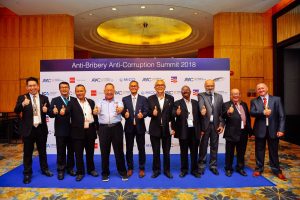
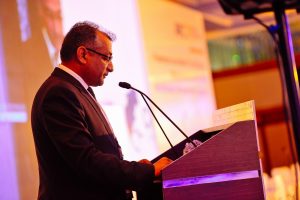

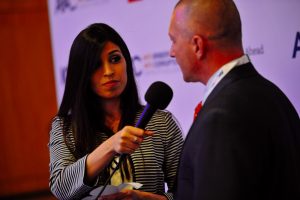
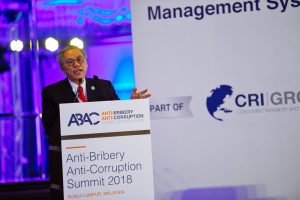
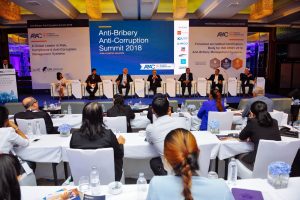
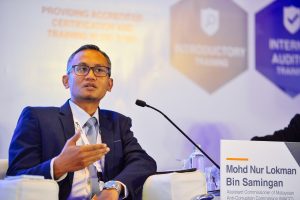


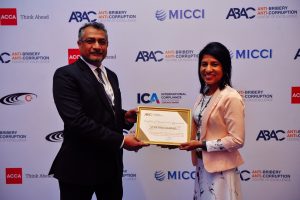
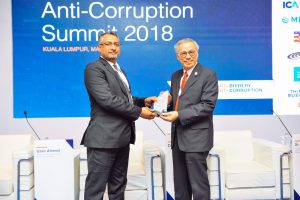
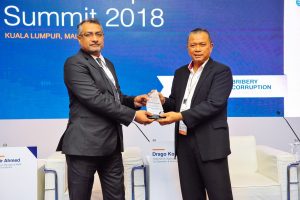
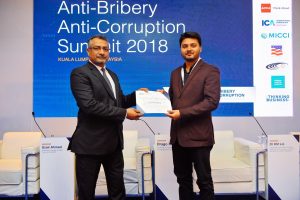
CONTACT US
Headquarter: +44 7588 454959
Local: +971 800 274552
Email: info@crigroup.com
Headquarter: 454959 7588 44
Local: 274552 800 971
Email: info@crigroup.com
NEWSLETTER SUBSCRIPTION